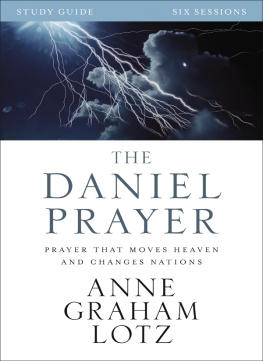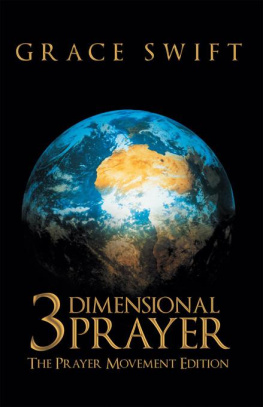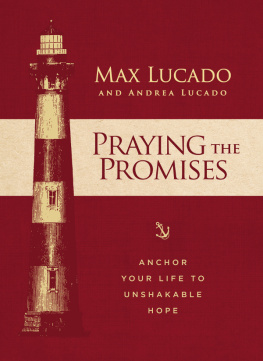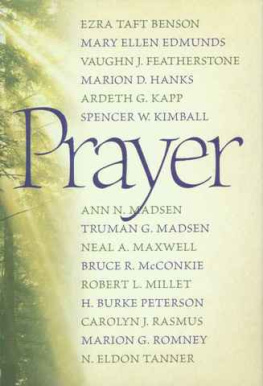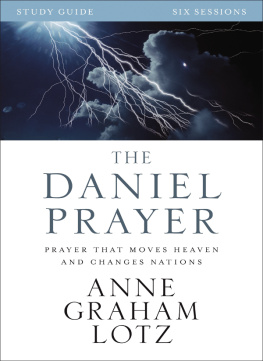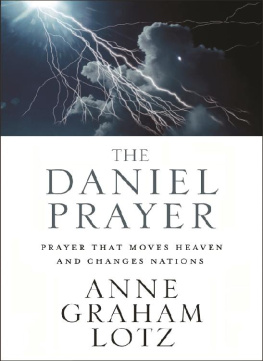Ebook Instructions
In this ebook edition, please use your devices note-taking function to record your thoughts wherever you see the bracketed instructions [Your Notes]. Use your devices highlighting function to record your response whenever you are asked to checkmark, circle, underline, or otherwise indicate your answer(s).
Information about External Hyperlinks in this ebook
Please note that endnotes in this ebook may contain hyperlinks to external websites as part of bibliographic citations. These hyperlinks have not been activated by the publisher, who cannot verify the accuracy of these links beyond the date of publication.
Copyright 2016 by Anne Graham Lotz
Adapted from material previously published in The Daniel Prayer.
Abridgement by Kris Bearss.
All rights reserved. No part of this publication may be reproduced, stored in a retrieval system, or transmitted in any form or by any meanselectronic, mechanical, photocopy, recording, or any otherexcept for brief quotations in printed reviews, without the prior permission of the publisher.
Requests for information should be addressed to:
Zondervan, 3900 Sparks Dr. SE, Grand Rapids, Michigan 49546
Published in association with the literary agency of Alive Communications, Inc., 7680 Goddard Street, Suite 200, Colorado Springs, CO 80920. www.alivecommunications.com
All Scripture quotations, unless otherwise indicated, are taken from The Holy Bible, New International Version, NIV. Copyright 1973, 1978, 1984, 2011 by Biblica, Inc. Used by permission of Zondervan. All rights reserved worldwide. www.Zondervan.com. The NIV and New International Version are trademarks registered in the United States Patent and Trademark Office by Biblica, Inc.
Any Internet addresses (websites, blogs, etc.) and telephone numbers in this book are offered as a resource. They are not intended in any way to be or imply an endorsement by Zondervan, nor does Zondervan vouch for the content of these sites and numbers for the life of this book.
ISBN 978-0-310-63205-4 (hardcover)
ISBN 978-0-310-63206-1 (ebook)
Epub Edition April 2019 9780310632061
19 20 21 22 23 / LSC / 9 8 7 6 5 4 3 2 1
CONTENTS
Guide
T he atmosphere was thick with the presence of God.
We were in Suva, Fiji, where Samaritans Purse was hosting a conference for church workers. Six hundred people had come in from the dozens of surrounding islands to attend. I had just finished speaking on the prophet Samuel, presenting the tragic truth that while he was a judge, a prophet, and a kingmaker extraordinaire, Samuel was not a good father. His sons did not follow the Lord. My challenge to the mostly male audience was not to be so focused on ministry that they neglected their own family.
When I issued the invitation to commit to training up their children in the Lord, almost the entire audience of pastors and church leaders surged forward. They began pouring out their hearts, urgently pleading with God to forgive, to have mercy, to bless.
I remember a woman seizing me by the arm and pulling me into her circle for prayer. Pray? I was totally intimidated to pray in such a group. When I opened my mouth and tried, my voice sounded hollow. My prayer seemed wretchedly anemic in the midst of such fervent intensity.
Rarely have I ever heard prayer like I heard on that day in Suva, Fiji. This has led me to wonder why our prayers often lack that kind of power, passion, and persuasion. What are we missing? What was I missing?
Could it be that one missing ingredient is a no-holds-barred, go-for-broke, nothing-held-back commitment to pray? The kind of commitment thats born out of desperation. Intense aspiration. Soulful longing. The kind of commitment athletes make to win the race, the game, the trophy, the medal.
The prayer that storms the gates of Heaventhe kind that Daniel prayedis not a run-of-the-mill, garden-variety type of prayer. Its a commitment that perseveres over any and every obstacle until Gods promises have been claimed and His purposes fulfilled.
Daniels original prayer was a desperate plea uttered by one man on behalf of his nation, Judah, that had come under Gods judgment. When the ten northern tribes of Israel had embraced idolatryrefusing to heed Gods repeated warnings of judgment if there was no national repentance of sinGod had sent in the Assyrians, who destroyed the Northern Kingdom. The Southern Kingdom of Judah, with the smaller tribe of Benjamin, was the remaining remnant of what had been the nation of Israel under King David and his successor-son, Solomon.
Now God was issuing those same warnings to Judah. He had sent messenger after messenger, including the prophets Jeremiah, Habakkuk, and Zephaniah, who had each faithfully delivered the message with every conceivable emphasis and nuance. They spoke clearly, powerfully, emotionally, factually, and accurately. The people were left with no excuse for not getting it. But the nation of Judah refused to heed Gods warnings, and so judgment fell.
Judgment came in the form of the Babylonians, who were ruled by the ruthless emperor Nebuchadnezzar. Following their conquest of two major world powersAssyria, then Egyptthey swept through Judah, leveled Jerusalem, looted the temple treasures, and forcibly took Gods people to Babylon in a series of three deportations, effectively enslaving the entire population. In a relatively short period of time, Judah was erased from the national scene. After more than five hundred years of existence, she was a people and a nation in exile.
Daniel was approximately fifteen years of age when he was captured by the Babylonians and deported eight hundred miles east of Jerusalem to serve as a slave in Nebuchadnezzars court. His situation seemed utterly hopeless and helpless. He had no human rights commission to appeal to, no dream team of lawyers to represent him. He was abducted to serve an emperor who had absolute world power and was accountable to no one. Yet through it all, Daniel glorified God by his character and his conduct. His service was so extraordinary that he rapidly rose up through the ranks to become a national leader as well as a counselor to kings.
As young as he was, Daniel may not have known about the power of prayer from experience. But as his story unfolds, its clear he knew something about the power of his God, perhaps based on his nations history. And it didnt take long for Daniel to discover the power of God through prayer. Again and again he threw himself upon God with such complete faith that God came through for him. Powerfully. Personally. Dramatically. Repeatedly.
Daniels meteoric rise to prominence is remarkable because, despite being subjected to a kind of cultural brainwashing upon arriving in Babylon, he again and again maintained his undivided devotion to God. In turn, Daniel rose to be the equivalent of prime minister under four emperors. And yet Daniel never forgot the temple that had been the heart of Jerusalem and of the nation. Even at the end of his life, he remained mindful of the sacrifices that had been offered to God there in worship. He longed for Jerusalem every day of his life, evidenced by the fact that three times daily, when he prayed, he turned his face in the direction of his beloved city that once had been.
Again and again, Daniels life was threatened. But each time, in response to his remarkable, steadfast faith, God miraculously intervened, until He performed the greatest miracle of all in answer to Daniels prayer: moving Emperor Cyrus to issue the decree that after seventy years of captivity, every Jew living in Babylon could go home.







